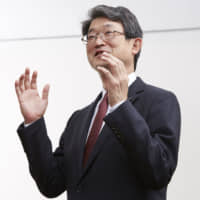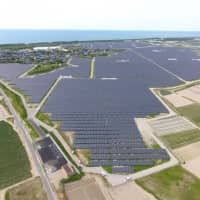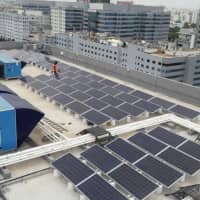Since its launch in 1964 as a leasing company, Orix Corp. has expanded its business scope to address the changing needs of society while refusing to categorize itself.
The Tokyo-based firm engages in a wide range of fields such as investment, life insurance, banking, asset management, automobile-related and real estate businesses, logging a net income of ¥313.1 billion and investing about ¥740 billion for the fiscal year that ended March 2018 with segment assets of ¥9 trillion.
The company's portfolio does not end there. As part of its efforts to contribute to society, Orix also works in the areas of environment and energy services, seeking to be of help in transitioning to a carbon-free society, create more efficient uses and supplies of energy, as well as the creation of a society that reuses and recycles.
After a little more than 20 years since it first invested in a wind power generation company in 1995, Orix has a total of 3 gigawatts of capacity secured at home and abroad in solar, wind, geothermal and other renewable energy projects. Revenues from the environment and energy businesses grew to ¥113.8 billion last fiscal year.
Head of Energy and Eco Services Business Headquarters Yuichi Nishigori, who also serves as director and senior managing executive officer, aims high and hopes to shore up its environment and energy commitment so that the sector will "be placed as one of Orix's core business fields."
To that end, Nishigori stressed the company plans to further capitalize on its accumulated assets and know-how. This includes its capability to generate solar power domestically worth 1,000 megawatts from projects it has secured business rights to, expansion of its distributed energy system, as well as proactive overseas development through large-scale mergers and acquisitions.
Currently, the business lineup of Orix's environment and energy sector covers a broad range, from renewable energy, power supply, energy conservation and storage batteries to recycling and waste management, in addition to overseas operations.
The firm has increased the number of solar power stations and facilities it operates across Japan. Nishigori noted that there are 116 sites for mega-solar power generation and around 500 locations for rooftop facilities, in addition to those from biomass, wind and geothermal power.
"We have secured a capacity of about 1,000 megawatts for solar power generation from those mega-solar and rooftop facilities, with 300 megawatts of them being scheduled to be online by March 2022," he said. "We are now one of the largest solar power generation producers in Japan."
What's unique to the company's strategy in solar power generation is dispersion of such power generation stations and facilities. "We don't operate a huge station at one site, so our portfolio is widely dispersed," he noted.
Nishigori said the firm plans to focus on retaining and improving their solar-related assets in Japan, rather than opening new facilities, as they already became a part of their stable revenue source. He added some changing outside factors were influencing their strategy.
"There has been a decline in the price in the feed-in tariff system (FIT, introduced in 2012) and except for some rooftop power generation locations, it's getting difficult to find appropriate sites," he explained. "The utilities have been fully supplied with electricity, so there is a limitation for connectivity with their power grids ... so I think the FIT-based solar power business has come to be settled, compared to the boom of the past several years."
In relation to the solar business, he pointed out the necessity of preventive maintenance of power generation plants, which he thinks deserve to be valued further in Japan.
"Operation and maintenance, especially how to conduct preventive maintenance, at power facilities is extremely important, even for solar power plants," Nishigori said. "There are some firms in Europe specializing in such operations. Introducing such technology from a Portuguese company, we would like to engage in this business on a full scale, focusing on the prevention of output power deterioration to maintain it for the next 20 years."
Beginning with its own facilities, he said Orix seeks to offer such operation and maintenance services to other companies in Japan in the future, since there is a growing market of such demand in Europe.
To further grow its energy sector, Nishigori thinks more development of its distributed energy system business is key.
Orix, jointly with NEC Corp., established One Energy Corp. in 2013, which has leased about 10,000 power grid-integrated home storage battery units. The whole idea can be described as a virtual power plant as the unit is remotely operated, meaning energy demand and supply can be properly controlled, Nishigori noted.
"There are still some institutional restrictions in Japan, so it still takes time to realize, but we'd like to manage, for example, the 10,000 units as a bundle and coordinate demand and supply for an electric system," he said. "We hope to be dominant in this distributed energy system field in the future, capitalizing on the first-mover advantage."
Moreover, he predicted that Japan will likely see a next phase for renewable energy development in the near future; meaning that it's essential to create distributed renewable energy power plants near each area of demand, rather than establishing more huge facilities.
"I think how to develop and retain a high-quality, low-cost plant is the key, in addition to controlling them utilizing information technology, so we're preparing for that by investing in some relevant companies," he explained.
Meanwhile, promoting reuse and recycling is an integral part of Orix's operations, prompting the firm to engage in the resources and waste businesses. The firm deals with about 200,000 end-of-lease asset contracts each year; around 80 percent of them are renewed, according to the company. Orix Eco Services Corp. utilizes its nationwide network to collect assets and promote reusing and recycling.
Orix Environmental Resources Management Corp. (OERM) operates advanced waste processing at its zero-emission plant in Yorii, Saitama Prefecture, featuring the latest thermal decomposition and gasification methods, according to Orix. The plant enables all of the waste to be recycled, as it melts refuse at roughly 2,000 degrees Celsius. Nishigori said the plant deals with about 450 tons of waste daily.
Zeeklite Co., a subsidiary of OERM, operates one of the largest controlled landfills in Japan, in Yonezawa, Yamagata Prefecture.
Orix works from intermediate processing (crushing and screening), incineration and melting, to final disposal in the flow of recycle and waste management. Nishigori said he expects large-scale consolidations will occur in this business field as there are so many long-established, family-run companies in operation.
"We'd like to utilize our businesses for possible mergers and acquisitions," he said.
On the overseas front, Orix has been active in expanding its global assets in the environment and energy fields. With business abroad starting in 1971 through its entry into Hong Kong, the firm now features bases in 38 countries and regions, especially Asia, where strong demand is expected.
For instance, Nishigori shared that Orix engages in distributed solar power generation in India and has invested in Bitexco Power Corp. in Vietnam for hydropower generation with a capacity of about 800 megawatts.
Meanwhile, Nishigori said Orix has invested about ¥70 billion into Ormat Technologies Inc., a U.S. company engaging in geothermal power generation that also owns geothermal plants in countries such as Kenya, Guatemala, Honduras and Indonesia.
The business scope of the American firm includes owning, operating, designing, manufacturing and selling geothermal plants in addition to developing its own geothermal resources, according to Orix.
Nishigori noted that Orix hopes collaboration with the American company will actively develop its geothermal business abroad.
"Where we want to focus on is doing business together in Asia," he said. "We have jointly conducted marketing in Indonesia and the Philippines where geothermal power generation is active."
Another ongoing focus of Orix abroad is in Europe, where the company can anticipate many merger and acquisition possibilities on the renewable energy front. To strengthen its business expansion in the region, Nishigori said the firm established Orix Corporation U.K. Ltd. in January.
"The European renewable energy market is quite active," he said. "Through this U.K. subsidiary, we are planning to build up our European renewable energy business platform through a series of M&As. Then, we hope this platform will open a gateway to other regions in the world."
This series highlights ESG (environmental, social and governance) activities of companies and other organizations.



















With your current subscription plan you can comment on stories. However, before writing your first comment, please create a display name in the Profile section of your subscriber account page.